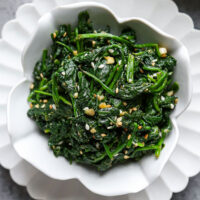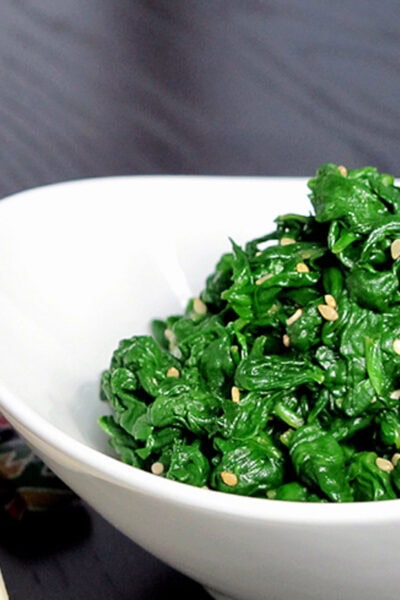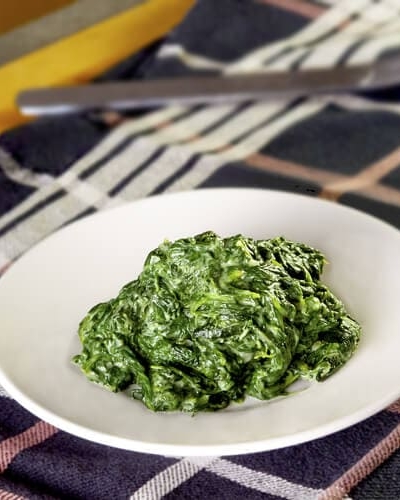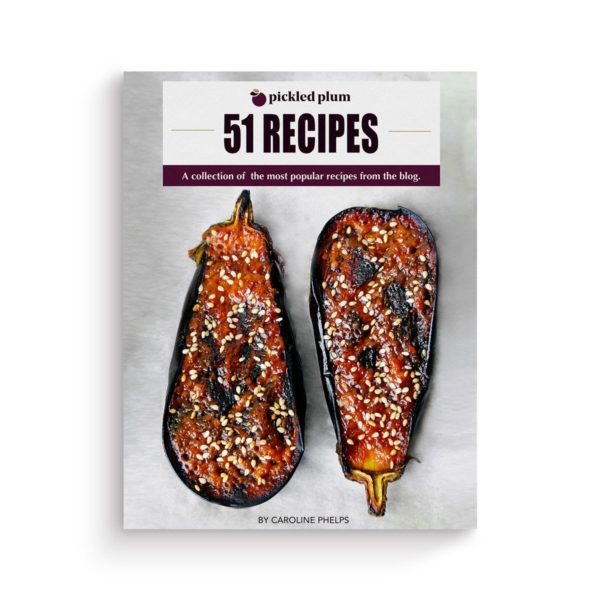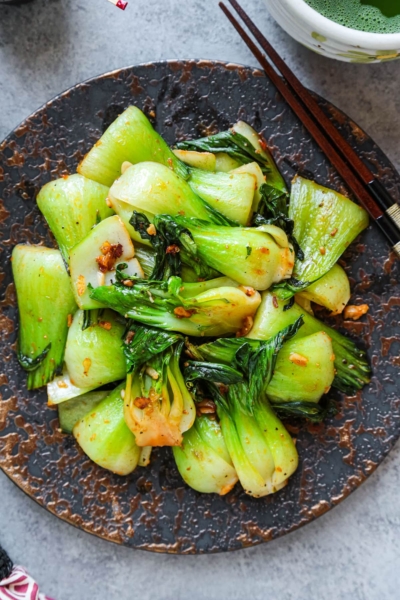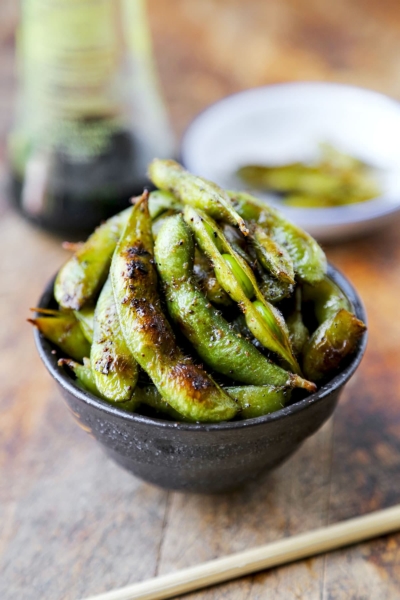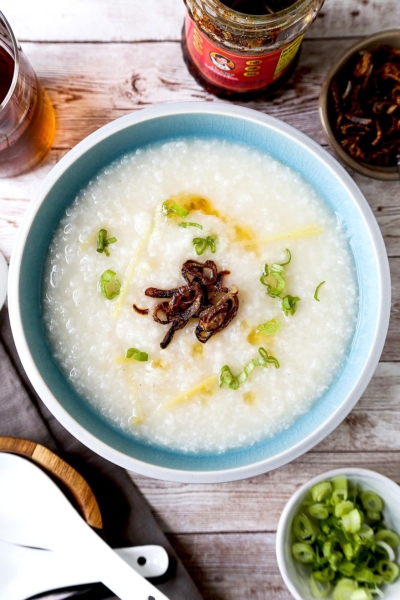Sigeumchi namul is a popular Korean spinach side dish often served with other sides (banchan) such as sookju namul (bean sprout salad) and kimchi, as part of a Korean barbecue dinner. It’s very easy to make and only requires 6 ingredients.
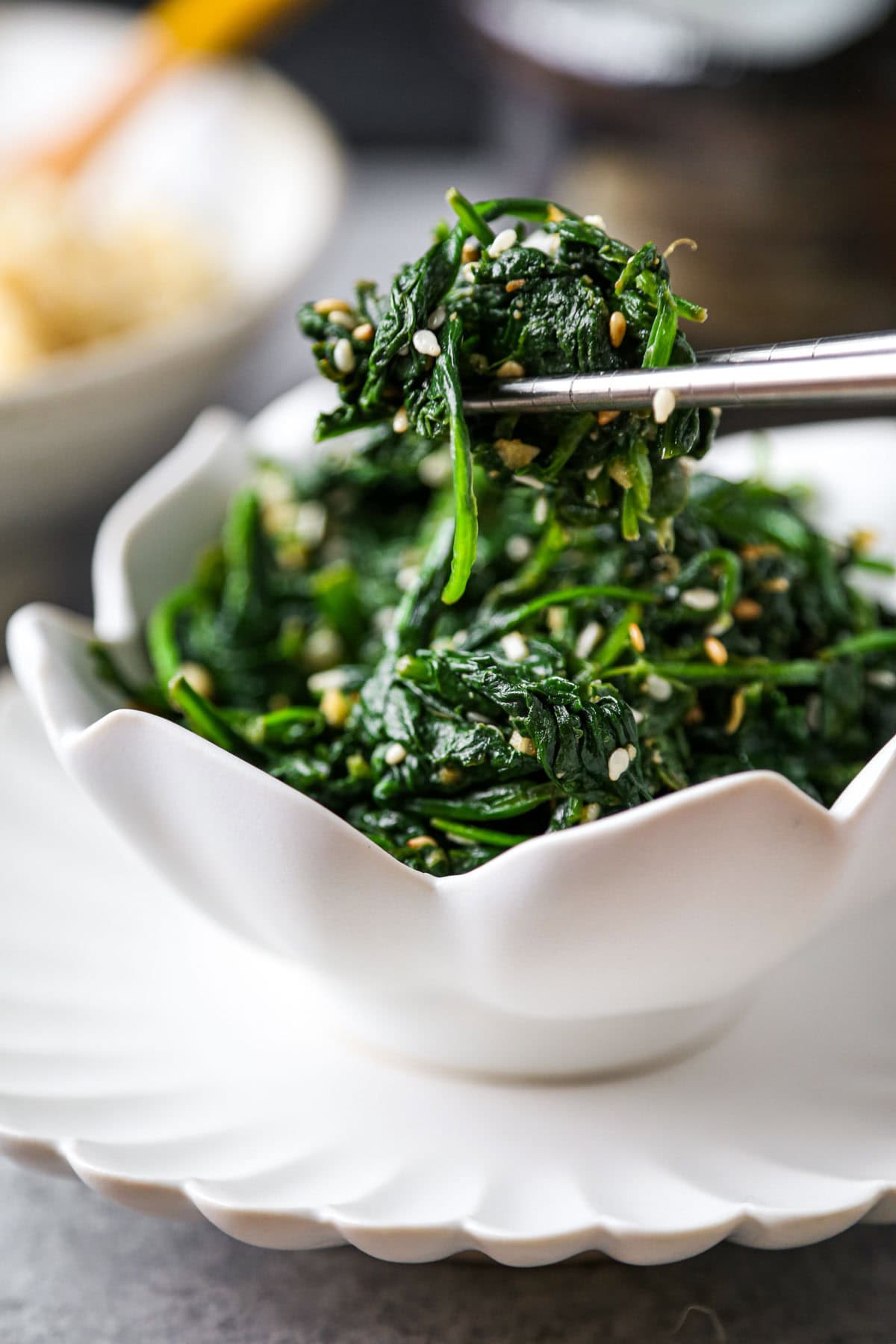
Why this recipe works
- Easy to make. Minimal chopping is required and the entire dish is ready in less than 15 minutes.
- Keeps well. The dish can be made ahead of time and will keep in the fridge for a few days.
- Simple flavors. The flavors of this Korean spinach side dish are mildly salty, savory, and nutty, which makes it easy to pair with other dishes.
Table of contents
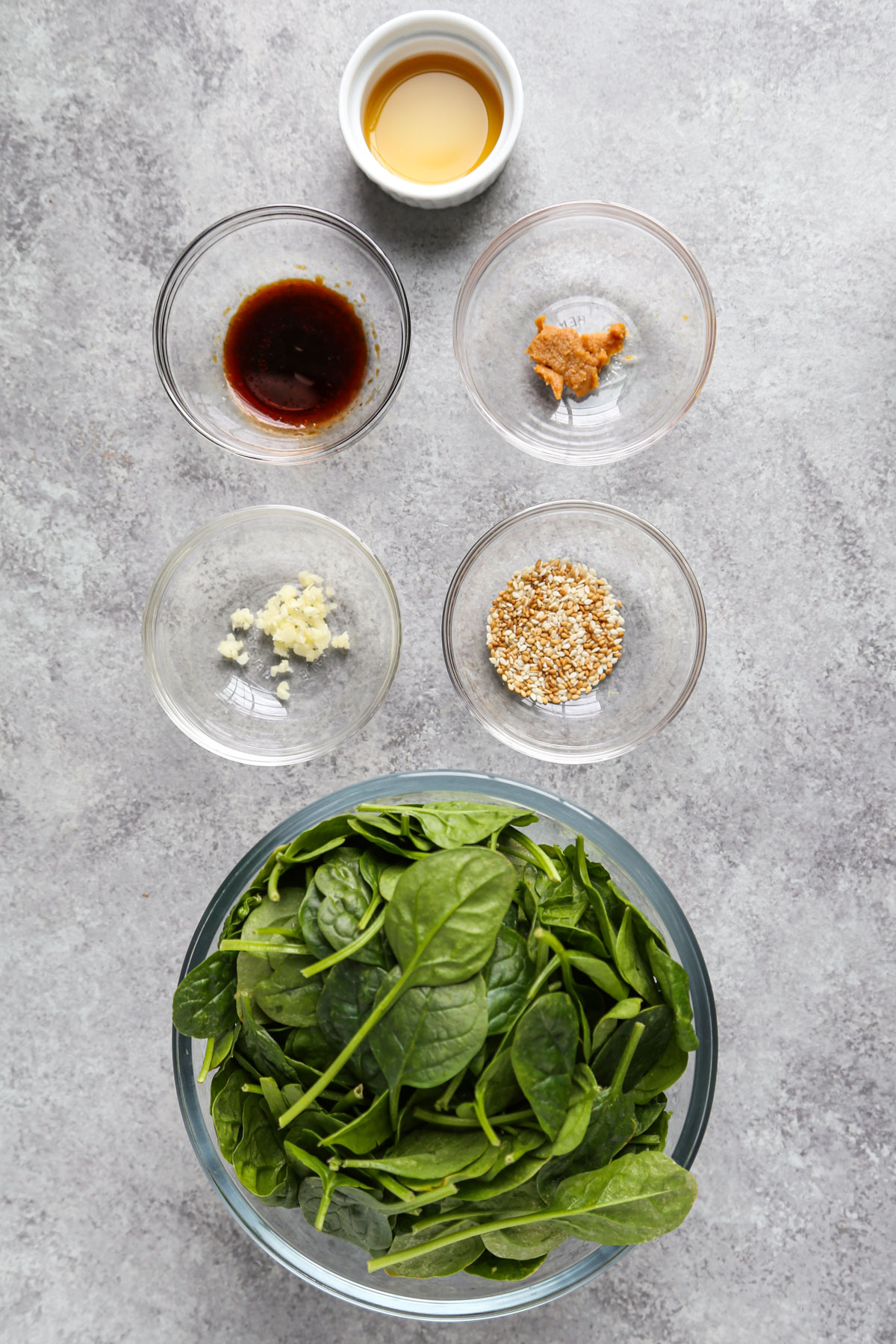
What is Korean Spinach Side Dish (Sigeumchi Namul)?
Sigeumchi namul (시금치 나물) is a traditional Korean side dish, called banchan (반찬), made of chilled spinach tossed in a mix of minced garlic, sugar, soy sauce, and sesame oil. The word namul refers to plants or leafy greens that are seasoned and served as a side. This Korean spinach side dish is most commonly served as a side to a bowl of rice, as part of a Korean bbq dinner, or as a topping for bibimbap.
For this recipe I have swapped the sugar for doenjang to give the dish more umami and depth of flavor.
Sigeumchi Namul Ingredients
- Spinach: Using Korean spinach is ideally recommended for this recipe. However, it can be hard to find if you don’t live near a Korean supermarket. If you cannot find it, the second best option is American savoy spinach. Lastly, regular spinach or baby spinach can also be used.
- Soy sauce: Korean soy sauce is saltier than other types of soy sauces and therefore, a little goes a long way. If you don’t have Korean soy sauce, use Japanese soy sauce, which has a similar taste. I recommend adding a little extra to the dish to match the level of saltiness of Korean soy sauce.
- Doenjang: Doenjang is a Korean soybean paste that’s very similar to miso paste. It’s full of salty, umami, and earthy flavors. Read more about doenjang here.
- Garlic: Minced garlic adds a little spiciness and a light floral element to the dish.
- Sesame oil: I recommend using toasted sesame oil as it’s more concentrated in flavor. In Korean cooking, regular sesame oil is usually used during the cooking process, while toasted sesame oil is added at the end of the cooking process to add a punch of nuttiness.
- Sesame seeds: Sesame seeds are used to add even more nuttiness to the overall taste of sigeumchi namul.
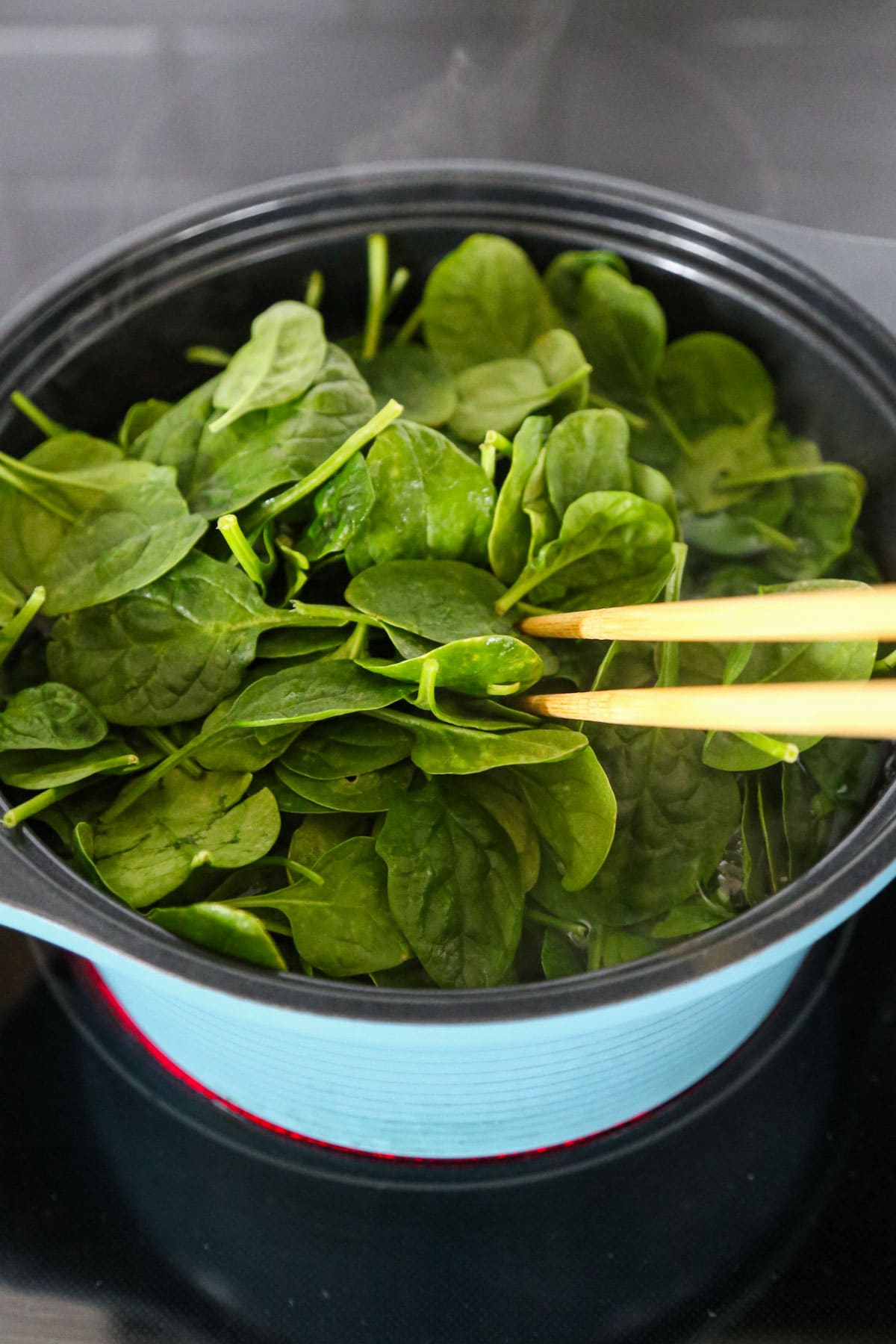
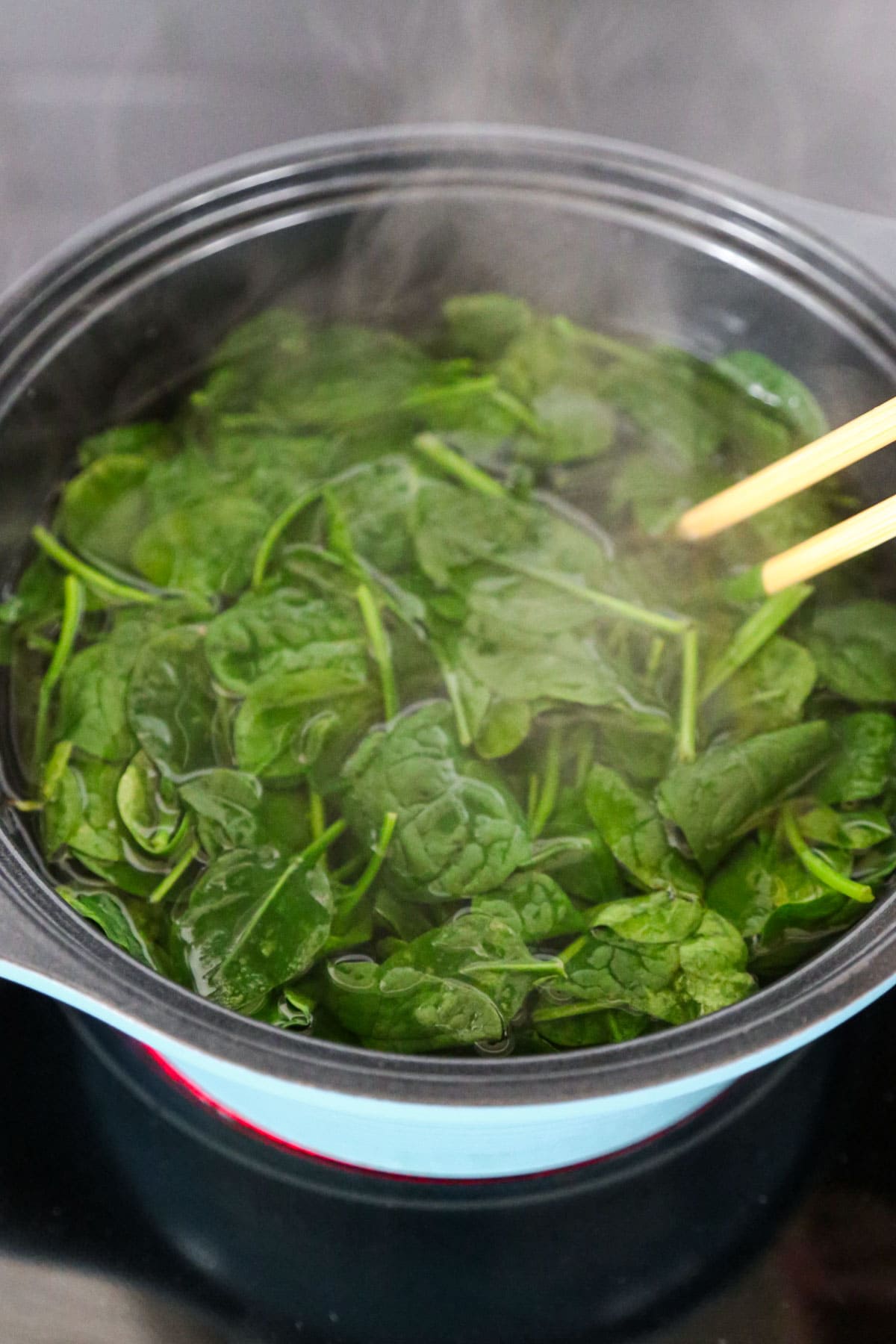
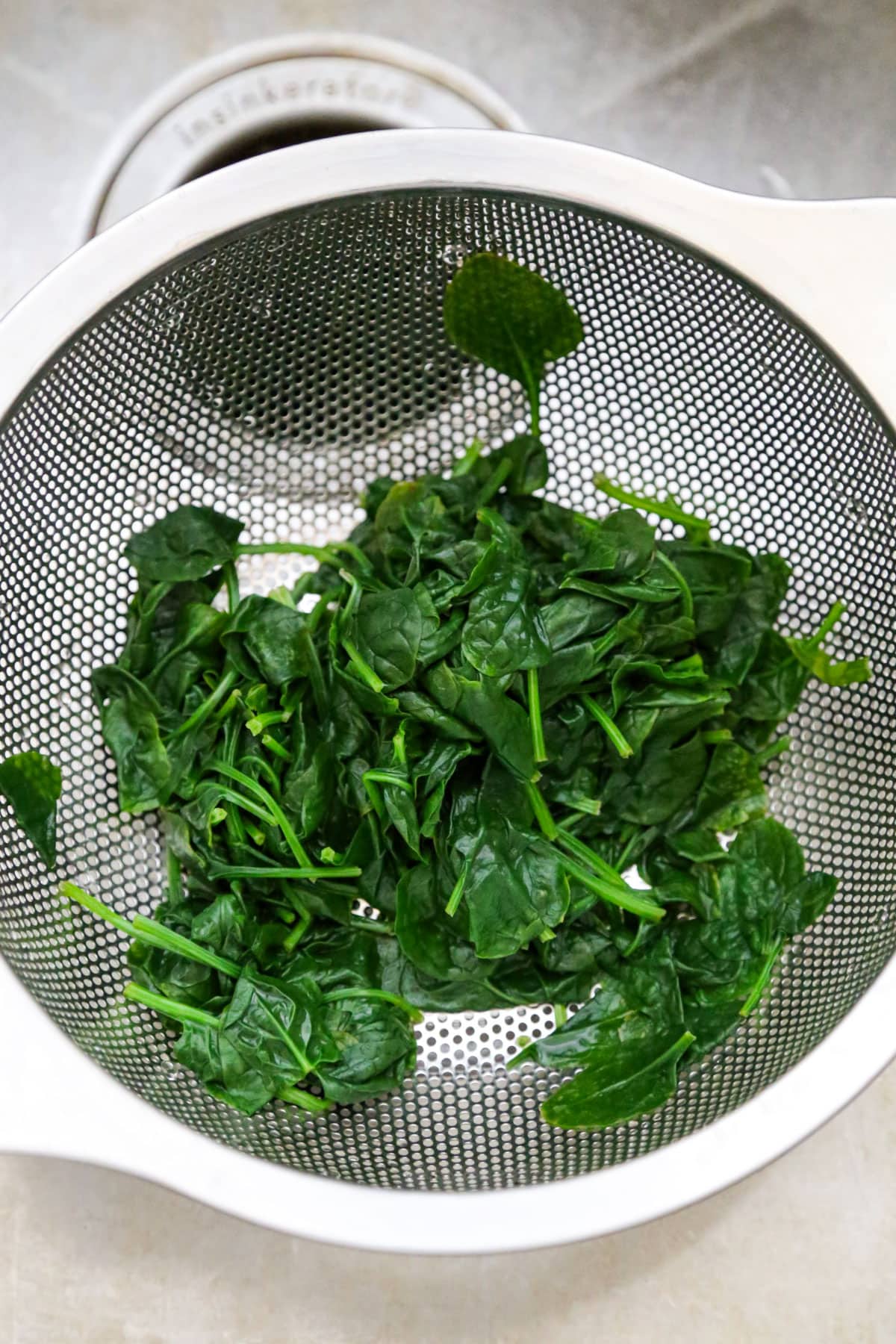

How To Make Korean Spinach Side Dish (Sigeumchi Namul)
Scroll all the way down to the recipe card to get the full recipe.
- Prep all of your ingredients and set up your work station.
- Fill a small pot with water and add about 1 teaspoon of salt. Bring the water to boil.
- Add the spinach to the boiling water and blanch it for 1 minute.
- Drain the spinach and rinse it under cold water to stop it from cooking further.
- Drain the spinach and gently squeeze it using your hands. Keep squeezing until most of the water has been drained.
- Place the spinach on a cutting board and cut in 3 equal parts.
- Mix the soy sauce, doenjang, garlic, sesame oil, and sesame seeds in a medium size bowl.
- Add the spinach to the bowl and toss to combine with sauce. Enjoy!
Variations
- Use white miso paste if you do not have or cannot find doenjang.
- Add 1 teaspoon of gochujang to the sauce for a spicy Korean spinach side dish.
- Add one or two chopped green onions for some crunch and a little sweetness.
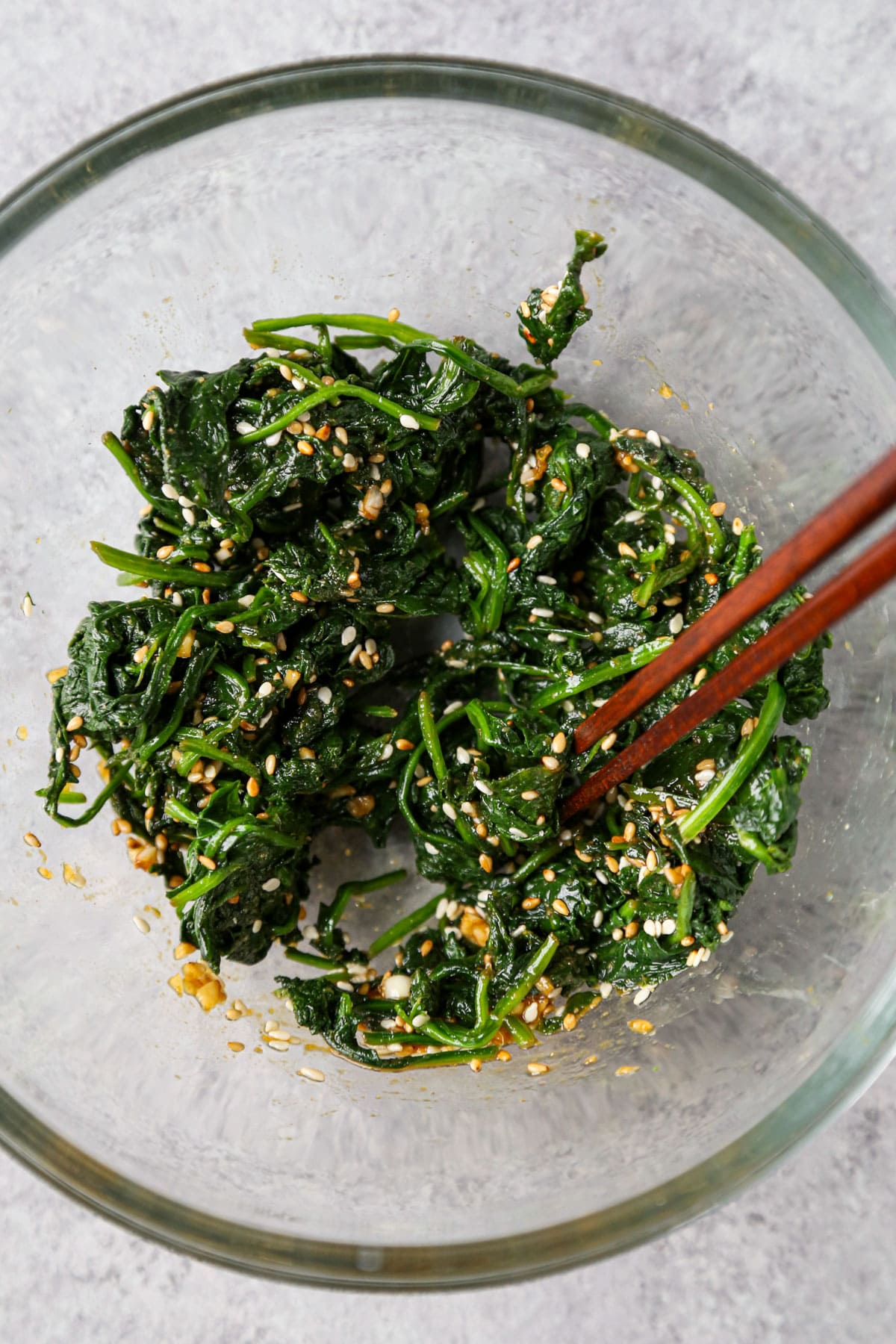
Storage
Sigeumchi namul is very easy to store. Simply transfer the spinach to a storage container and leave it in the fridge for up to 5 days.
Frequently Asked Questions
Because sigeumchi namul contains soy sauce, it is not gluten-free. However, it can easily be made gluten-free by swapping regular soy sauce for tamari or liquid aminos.
Korean spinach is more fibrous and solid, which means that it holds better than other types of spinach when it’s cooked or boiled. The taste is also sweeter than regular spinach. Finally, the shape of the leaves are different, with pointed tips, almost like a Christmas tree.
While these two dishes are very similar to one another, traditional sigeumchi namul uses Korean spinach versus regular spinach. The seasoning in Japanese oshitashi is also different since it contains mirin instead of sugar, and doesn’t contain any garlic.
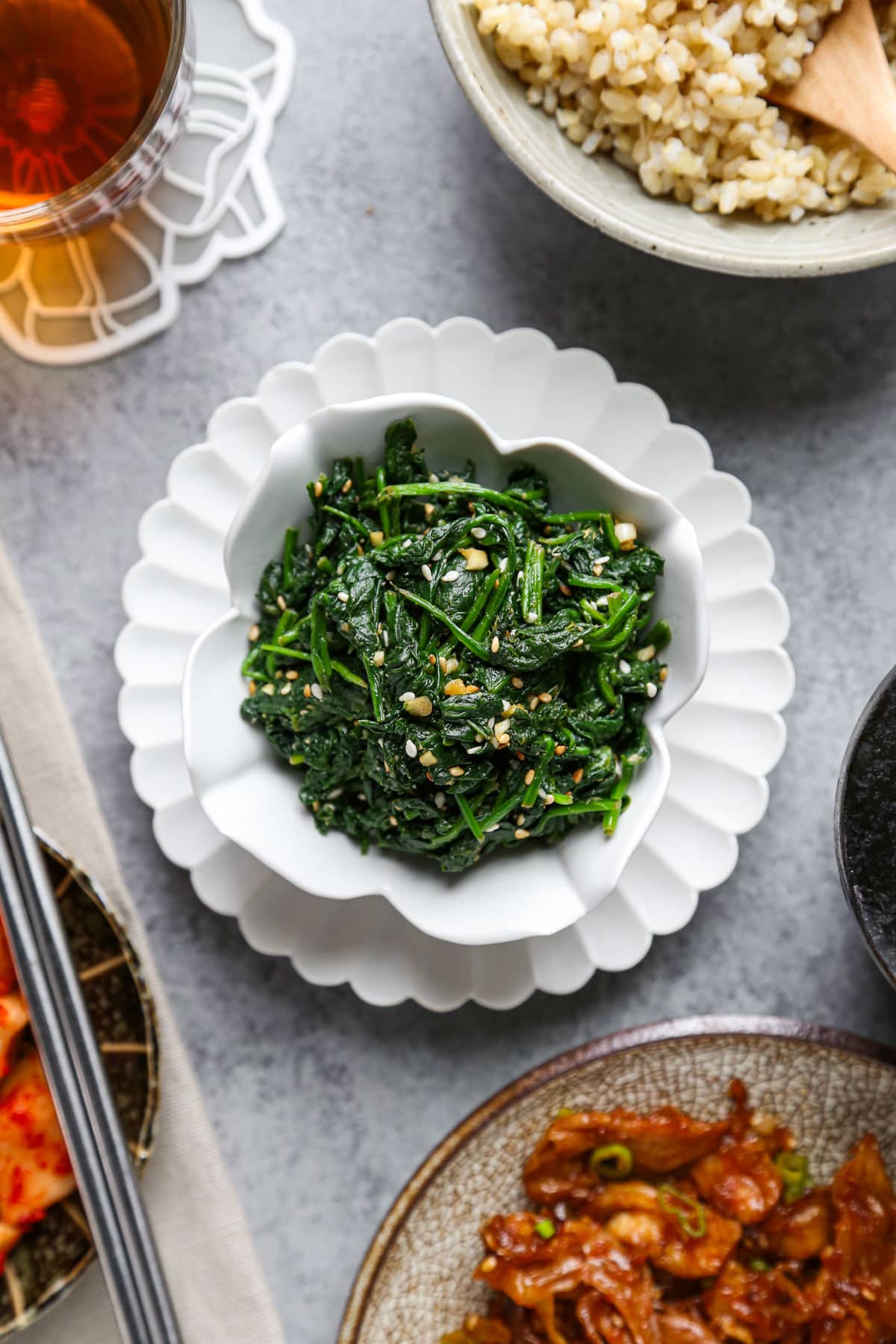
How To Serve Sigeumchi Namul
As previously mentioned, sigeumchi namul is considered a side dish and is usually served with a side of rice or as a topping for bibimbap. It can also be served as a side to other popular Korean dishes such as:
- Japchae (Korean glass noodles)
- Tteokbokki (Korean spicy rice cakes)
- Chicken bulgogi (Korean bbq chicken)
- Vegan jajangmyeon (Korean noodles with black bean sauce)
- Kimchi jjigae (kimchi stew)
TABLEWARE
Like some of the tableware in this post? They are available at Musubi Kiln.
Musubi Kiln is an online store specializing in high quality handmade Japanese tableware and dinnerware. Each product is made by Japanese craftsmen using traditional techniques that have been passed down from generation to generation.
Receive 10% off your purchase when using the code CAROLINE at checkout.
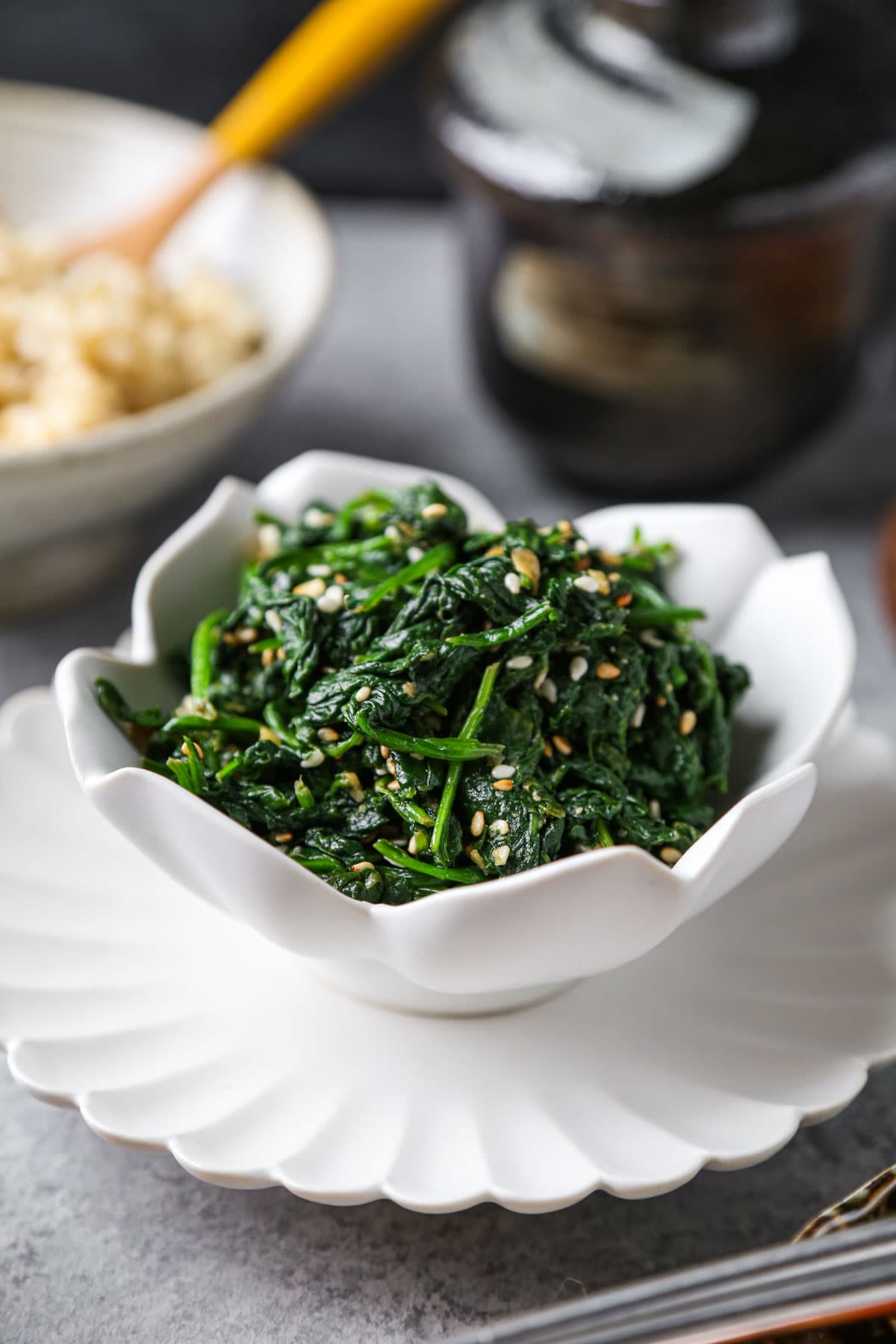
Subscribe to my newsletter and receive the latest recipes and weekly favorites straight to your inbox. Join me on Pinterest, Facebook, and Instagram for more cooking tips and adventures!
Did you like this recipe? Are there changes you made that you would like to share? Share your tips and recommendations in the comments section below!
PrintKorean Spinach Side Dish (Sigeumchi Namul)
Sigeumchi namul is a popular Korean chilled spinach side dish seasoned with a savory and nutty sauce. Only 6 ingredients are needed.
- Prep Time: 10 minutes
- Cook Time: 1 minute
- Total Time: 11 minutes
- Yield: 2 servings 1x
- Category: Side
- Method: Boiling
- Cuisine: Korean
- Diet: Vegan
Ingredients
- 5 or 6 ounces Korean spinach, savoy spinach, regular spinach, or baby spinach
Sauce
- 1 teaspoon soy sauce
- 1/2 teaspoon doenjang (Korean soybean paste) or white miso paste
- 1 garlic clove, minced
- 1 teaspoon toasted sesame oil or regular sesame oil
- 1 teaspoon toasted sesame seeds
Instructions
- Bring a pot or large pan of water to boil, with a little salt added.
- Add spinach to boiling water and cook for 1 minute.
- Drain and rinse under cold water until the spinach is cold. Drain again and squeeze out as much water as you can from the spinach, without pressing too hard.
- Transfer the spinach to a cutting board and slice it in 3 equal parts.
- Whisk all the ingredients for the sauce into a medium size mixing bowl and add the spinach.
- Toss the spinach with the sauce using chopsticks or your hands. Serve.
Notes
Save the leftovers in a storage container and refrigerate for up to 5 days.
Nutrition
- Serving Size: 1 serving
- Calories: 67
- Sugar: 0.5g
- Sodium: 139mg
- Fat: 5g
- Saturated Fat: 0.7g
- Unsaturated Fat: 2g
- Trans Fat: 0g
- Carbohydrates: 4.3g
- Fiber: 2g
- Protein: 2.9g
- Cholesterol: 0mg
